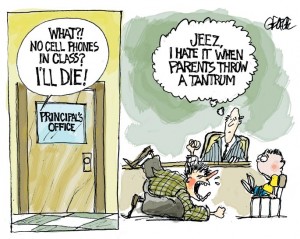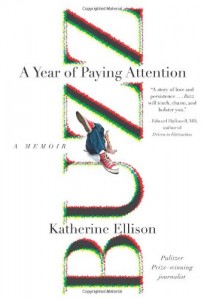|
|
November 22, 2010
In a rare but not unprecedented move, we sent our intrepid Time Traveler back to the late 1980s to report on the historic role of parents in their children’s education. What she uncovered may be hard for us 21st Century parents to believe, but we’ve verified her account by cross-referencing it with archival documents as well as first hand reports from today’s Elders and young adults who swear this is the way it was. Her report is excerpted here:
On weekdays during the 1980s, parents kissed their kids goodbye at the front door and sent them out into the world. The children either marched themselves to a bus stop, walked to school or rode a bike (yes they had helmets, though nowhere as cool as the ones we’ve got) From the moment they turned the corner, parents could not directly communicate with their kids.
WARNING: If you find yourself feeling anxious reading the above, we recommend putting your head between your knees and breathing in slowly through your nose and exhaling slowing through you mouth. If that doesn’t alleviate your symptoms, shut down your computer and take a warm bath, with or without bubbles.
All during morning classes, lunchtime, recess, afternoon classes and onsite after school programs, kids were incommunicado. You’re probably wondering, “What if the kid left a lunch, a book or assignment at home? How could Mom or Dad rush to school to help if they didn’t know there was a problem?” The teachers and school administrators of the ’80s had a simple answer for that one: If the kid doesn’t bring something (s)he needs to schoool, then the kid figures it out and deals with the consequences. Period.
Cruel and unusual punishment, granted, but that’s the way it was.
In case you’re shaking your head thinking, “That sounds like a lockdown!” 20th Century schools weren’t entirely lacking compassion. For example, if a kid complained of a headache, (s)he asked the teacher’s permission to go to the office where she’d plead her case to the school nurse and likely be given an opportunity to rest quietly. If the nurse felt the situation warranted it, the school placed a call home or to the parents’ office and the problem was solved. Are they for real?! Think of the precious moments lost using that antiquated system!
 Today, thankfully, we can call and/or text our kids at any time, including 9-3 and we do…often! Yet, apparently, some schools are cracking down on in-class cellphone use. They say the constant ringing and buzzing is a distraction to teachers and any students interested in receiving an education. (What kind of lame excuse is that?) In addition, schools limiting students’ cellphone access also justify it by saying the policy reduces in-class cheating and cyber-bullying. Hmm. Well, maybe we can see some logic there, but who cares?! Schools have no right to prioritize education over a parent’s access to their children. This is the 21st Century, Ms. Principal, and these are Anxious Times. Today, thankfully, we can call and/or text our kids at any time, including 9-3 and we do…often! Yet, apparently, some schools are cracking down on in-class cellphone use. They say the constant ringing and buzzing is a distraction to teachers and any students interested in receiving an education. (What kind of lame excuse is that?) In addition, schools limiting students’ cellphone access also justify it by saying the policy reduces in-class cheating and cyber-bullying. Hmm. Well, maybe we can see some logic there, but who cares?! Schools have no right to prioritize education over a parent’s access to their children. This is the 21st Century, Ms. Principal, and these are Anxious Times.
Your thoughts?

November 12, 2010
The following parent’s “pledge” was originally written for and posted on SafetyWeb.com. SafetyWeb is a thoughtfully designed tool that provides parents with a means and a context for ongoing family conversations about safety, friendship and how the choices we make, online and off, have consequences.
 FOAD!! 3 out of 4 t(w)eens regularly use social media. (UPDATE Oct. 2013: The proportion of teens who say they don’t use social networks fell from 6% earlier this year to 2% the latest survey reports.) While the young ‘uns are scary good at navigating the tech, when it comes to connecting the dots between their digital choices and the resulting social consequences, most of them are clueless. If your kid has a cellphone and access to the Internet it’s up to you to teach them how to behave.
Q: If you don’t, who will?
A: Their equally clueless friends.
As a parent, I pledge to do the following to raise a responsible Netcitizen and teach my child about online safety:
- Social media is part of my child’s world. As a Safety Conscious Digital Parent, I pledge to do my best to raise my child to be a responsible digital citizen.
- I pledge to support my child’s use of age-appropriate social networking sites and to teach my child how to play safe and stay safe online so (s)he can grow in positive ways from online activities.
- I pledge to teach my child the difference between what is and what is not responsible and appropriate online behavior. That includes teaching my child the best ways to respond to anything online that makes him/her uncomfortable, angry or scared.
- I pledge to help my child understand the risks of giving out or posting personal information publicly online. (including photos, age, last name, name of school, home address, phone number.)
- Digitally-savvy kids’ “status anxiety” (their need to be accepted) affects their online behavior. My child has the right to choose his/her friends, but not the right to demean, harass or intimidate others. I pledge to make sure (s)he gets this message and acts accordingly.
- I pledge to have open, respectful dialogues with my child about how (s)he uses the services I give her access to online. When my child messes up (it’ll happen), I pledge to use the opportunity to teach him/her more socially acceptable behavior.
- I pledge to help my child discern between a true friend and someone with bad intentions, so that (s)he can use good judgment regarding online “friends,” as well as his/her own behavior.
- I pledge to educate my child on how their public online activity leaves a lasting digital footprint that teachers, college admissions officers, or future employers may see.
- I pledge to help my child understand the implications of online behavior so that my child can maintain his/her privacy, safety and good reputation while we keep a healthy, trusting and mutually respectful relationship between us.
You don’t need me to tell you why this stuff is import. So… can we all count on each other to do this?

November 9, 2010
 "Buzz: A Year of Paying Attention" by Katherine Ellison Today’s guest is Pulitzer Prize-winning investigative journalist Katherine Ellison. A veteran foreign correspondent and writing consultant, Katherine is also the mother of two sons and the author of four books including The Mommy Brain: How Motherhood Makes Us Smarter and her new memoir Buzz: A Year of Paying Attention.
Katherine Ellison gives all she’s got to every professional assignment. (You don’t win a Pulitzer Prize for phoning it in!) One day, she was driving on the freeway, late for a meeting with a new client, when her 12 year old son, Buzz, who’s got ADHD, had yet another major melt-down. Katherine’s 60-mile per hour response was equally over the top. That’s when she decided it was time to put on the brakes, back-burner all other career plans and spend a year paying attention to Buzz and his diagnosis while chronicling her findings and her feelings. In the process she discovered that she too has ADHD (which explained so much about the challenges she’s faced as a journalist and a mom).
Katherine diligently researched and investigated a wide range of ADHD treatments currently available to exhausted, loving parents like herself . For millions of Moms and Dads around the country and abroad who want desperately to help their children with attention deficit disorders find ways to get more control over their behavior so they can be happier and more successful in the classroom and beyond, her book is a welcome and much-needed resource.
If you or someone you care about has a child dealing with ADD/ADHD, you don’t want to miss this interview.
Listen to my conversation with Katherine Ellison right here:
[QUICKTIME http://www.anniefox.com/podcast/FC022.m4a 300 300 false true]
If you have iTunes, you can subscribe to this podcast in the iTunes Store.
Or, you can download an MP3 version here.
Upcoming guests include:
Sean Buvala, author of DaddyTeller: How to be a Hero to Your Kids and Teach Them What’s Really Important By Telling Them One Simple Story at a Time
Dr. Karyn Purvis, co-author (with Dr. David Cross, Wendy Lyons Sunshine) of The Connected Child: Bring hope and healing to your adoptive family
Judith Warner, author of Perfect Madness: Motherhood in the Age of Anxiety and We’ve Got Issues: Children and Parents in the Age of Medication
Rachel Simon, author of Riding The Bus With My Sister and The House on Teacher’s Lane

| |
 Today, thankfully, we can call and/or text our kids at any time, including 9-3 and we do…often! Yet, apparently, some schools are cracking down on in-class cellphone use. They say the constant ringing and buzzing is a distraction to teachers and any students interested in receiving an education. (What kind of lame excuse is that?) In addition, schools limiting students’ cellphone access also justify it by saying the policy reduces in-class cheating and cyber-bullying. Hmm. Well, maybe we can see some logic there, but who cares?! Schools have no right to prioritize education over a parent’s access to their children. This is the 21st Century, Ms. Principal, and these are Anxious Times.
Today, thankfully, we can call and/or text our kids at any time, including 9-3 and we do…often! Yet, apparently, some schools are cracking down on in-class cellphone use. They say the constant ringing and buzzing is a distraction to teachers and any students interested in receiving an education. (What kind of lame excuse is that?) In addition, schools limiting students’ cellphone access also justify it by saying the policy reduces in-class cheating and cyber-bullying. Hmm. Well, maybe we can see some logic there, but who cares?! Schools have no right to prioritize education over a parent’s access to their children. This is the 21st Century, Ms. Principal, and these are Anxious Times.












